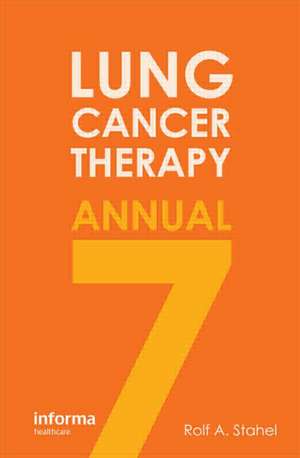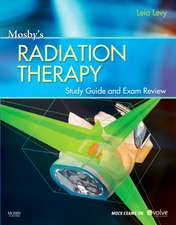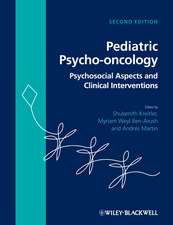Lung Cancer Therapy Annual 7
Editat de Rolf A. Stahelen Limba Engleză Hardback – 13 aug 2012
Oncology research and practice in lung cancer continues to develop rapidly. This latest edition of an acclaimed reference briefs the oncology community with a review of the recent literature, emphasizing the most significant therapeutic advances. The expert contributions of Lung Cancer Therapy Annual 7 offer an update of the impact that this information will have on the day-to-day management of the lung cancer patient.
New to the seventh edition are four new chapters on the treatment of non-small cell lung cancer (NSCLC) and a new chapter on thymoma. Additional topics include:
- Oncogenic driver mutations
- First line therapy of advanced non-small cell lung cancer without activating EGFR mutation
- Second line therapy of non-small cell lung cancer
- Adjunct and neoadjunct therapy of non-small cell lung cancer
- Advances in surgery of lung cancer; advances in radiotherapy of lung cancer
- Mesothelioma
- Thymic tumors
Preț: 692.77 lei
Preț vechi: 877.94 lei
-21% Nou
Puncte Express: 1039
Preț estimativ în valută:
132.56€ • 138.41$ • 109.46£
132.56€ • 138.41$ • 109.46£
Carte tipărită la comandă
Livrare economică 15-29 aprilie
Preluare comenzi: 021 569.72.76
Specificații
ISBN-13: 9781841848655
ISBN-10: 1841848654
Pagini: 184
Ilustrații: 37 tables, 11 halftones, 7 color halftones and 15 line drawings
Dimensiuni: 174 x 246 x 17 mm
Greutate: 0.57 kg
Ediția:Revizuită
Editura: CRC Press
Colecția CRC Press
ISBN-10: 1841848654
Pagini: 184
Ilustrații: 37 tables, 11 halftones, 7 color halftones and 15 line drawings
Dimensiuni: 174 x 246 x 17 mm
Greutate: 0.57 kg
Ediția:Revizuită
Editura: CRC Press
Colecția CRC Press
Public țintă
Professional ReferenceCuprins
1. Epidemiology
2. Prevention, early detection, and screening
3. Staging
4. Histopathology and molecular pathology
5. Oncogenic driver mutations
6. First line therapy of advanced non-small cell lung cancer without activating EGFR mutation
7. First line therapy of advanced non-small cell lung cancer with activating EGFR mutation
8. Second line therapy of non-small cell lung cancer
9. Adjuvant and neoadjuvant therapy of non-small cell lung cancer
10. Advances in surgery of lung cancer
11. Advances in radiotherapy of lung cancer
12. Small cell lung cancer
13. Mesothelioma
14. Thymoma
2. Prevention, early detection, and screening
3. Staging
4. Histopathology and molecular pathology
5. Oncogenic driver mutations
6. First line therapy of advanced non-small cell lung cancer without activating EGFR mutation
7. First line therapy of advanced non-small cell lung cancer with activating EGFR mutation
8. Second line therapy of non-small cell lung cancer
9. Adjuvant and neoadjuvant therapy of non-small cell lung cancer
10. Advances in surgery of lung cancer
11. Advances in radiotherapy of lung cancer
12. Small cell lung cancer
13. Mesothelioma
14. Thymoma
Notă biografică
Rolf A. Stahel, M.D. is head of the Center for Lung and Thoracic Oncology and Senior Staff Physician at the Clinic of Oncology, University Hospital of Zürich as well as Titular Professor of Medicine at the University of Zürich, Switzerland. He is certified in Internal Medicine and Medical Oncology by both the American and Swiss Board. His major interest is thoracic oncology, including multidisciplinary treatment approaches, translational research, and targeted therapy.
Recenzii
"This is an excellent resource for beginners as well as advanced specialists in the field. The references are current to the year 2008 and the individual chapters are brief and complete and will give readers a solid foundation in the treatment of lung cancer to build upon." - K. P. Ravikrishnan, FRCP (C), FACP FCCP(William Beaumont Hospitals)
K. P. Ravikrishnan, FRCP (C), FACP FCCP(William Beaumont Hospitals)
**Description**
This annual compendium of articles pertaining to the treatment of lung cancer with pertinent references is well written and will help busy practitioners learn about advances in treatment. It is an excellent resource for trainees in oncology and fellows, as well as nurses, nurse clinicians, and nurse navigators. The book is current and the references are date to 2008.
**Purpose**
The purpose is to review the recent literature on the developments in therapeutic methods for lung cancer and to summarize the currently available modalities for treating small cell and non-small cell lung cancer.
**Audience**
The book will be useful to healthcare professionals in the field of oncology, including physicians and paramedical personnel. It can be used as well by the residents and students in training and those in affiliated areas, such as pharmacology. With its well written style and simple format, it is suitable for generalists as well.
**Features**
The introductory chapter is a very good outline of the worldwide problems in healthcare, especially the care of lung cancer patients. The impact of lung cancer on healthcare, with a strong emphasis on the impact of smoking cessation on the decrease in cancer incidence among male smokers is well addressed. The recent developments in the pharmacogenetics of non-small cell lung cancer are covered well; this section is useful for a beginner to get a good grasp of the topic and is thorough enough for an advanced reader to brush up on the topic.
The chapters on the treatment of lung cancer are the highlights of the book and are excellent resources to build on to expand your knowledge on these topics.
**Assessment**
This is an excellent resource for beginners as well as advanced specialists in the field. The references are current to the year 2008 and the individual chapters are brief and complete and will give readers a solid foundation in the treatment of lung cancer to build upon.
K. P. Ravikrishnan, FRCP (C), FACP FCCP(William Beaumont Hospitals)
**Description**
This annual compendium of articles pertaining to the treatment of lung cancer with pertinent references is well written and will help busy practitioners learn about advances in treatment. It is an excellent resource for trainees in oncology and fellows, as well as nurses, nurse clinicians, and nurse navigators. The book is current and the references are date to 2008.
**Purpose**
The purpose is to review the recent literature on the developments in therapeutic methods for lung cancer and to summarize the currently available modalities for treating small cell and non-small cell lung cancer.
**Audience**
The book will be useful to healthcare professionals in the field of oncology, including physicians and paramedical personnel. It can be used as well by the residents and students in training and those in affiliated areas, such as pharmacology. With its well written style and simple format, it is suitable for generalists as well.
**Features**
The introductory chapter is a very good outline of the worldwide problems in healthcare, especially the care of lung cancer patients. The impact of lung cancer on healthcare, with a strong emphasis on the impact of smoking cessation on the decrease in cancer incidence among male smokers is well addressed. The recent developments in the pharmacogenetics of non-small cell lung cancer are covered well; this section is useful for a beginner to get a good grasp of the topic and is thorough enough for an advanced reader to brush up on the topic.
The chapters on the treatment of lung cancer are the highlights of the book and are excellent resources to build on to expand your knowledge on these topics.
**Assessment**
This is an excellent resource for beginners as well as advanced specialists in the field. The references are current to the year 2008 and the individual chapters are brief and complete and will give readers a solid foundation in the treatment of lung cancer to build upon.
Descriere
Oncology research and practice in lung cancer continues to develop rapidly. This latest edition of an acclaimed reference briefs the oncology community with a review of the recent literature, emphasizing the most significant therapeutic advances. The expert contributions offer an update of the impact that this information will have on the day-to-day management of the lung cancer patient. New to the seventh edition are four new chapters on the treatment of non-small cell lung cancer (NSCLC) and a new chapter on thymoma. Additional topics include oncogenic driver mutations, advances in surgery and radiotherapy of lung cancer, and mesothelioma.







